A newborn's failure to pass meconium within the first 24 hours after birth may indicate which of the following?
Abdominal wall defect
Celiac disease.
Intussusception
Hirschsprung disease
The Correct Answer is D
A. Abdominal wall defect:
Failure to pass meconium within the first 24 hours after birth can indicate a potential obstruction in the gastrointestinal tract. While an abdominal wall defect could potentially cause gastrointestinal issues, it is not specifically associated with failure to pass meconium.
B. Celiac disease:
Celiac disease is an autoimmune disorder characterized by an abnormal immune response to gluten. While celiac disease can cause gastrointestinal symptoms, such as diarrhea and abdominal pain, it is not typically associated with failure to pass meconium in the newborn period.
C. Intussusception:
Intussusception occurs when one segment of the intestine telescopes into another, causing a bowel obstruction. While intussusception is a cause of bowel obstruction in infants, it typically presents with symptoms such as colicky abdominal pain, vomiting, and the passage of "currant jelly" stool, rather than failure to pass meconium.
D. Hirschsprung disease:
Hirschsprung disease is a congenital condition characterized by the absence of ganglion cells in the distal portion of the colon, leading to functional obstruction. Failure to pass meconium within the first 24 hours after birth is a classic sign of Hirschsprung disease. This condition requires surgical intervention to remove the affected portion of the colon and restore normal bowel function.

Nursing Test Bank
Naxlex Comprehensive Predictor Exams
Related Questions
Correct Answer is D
Explanation
A. Maculopapular lesions between fingers and toes:
This finding is not typically associated with atopic dermatitis. Maculopapular lesions between the fingers and toes are more commonly seen in conditions like scabies or fungal infections.
B. Inflamed area with white exudate:
This finding is also not characteristic of atopic dermatitis. An inflamed area with white exudate may indicate a bacterial infection rather than atopic dermatitis.
C. Nonpruritic erythematous papule:
Atopic dermatitis often presents with erythematous (red) papules (small raised bumps) that are pruritic (itchy). However, the presence of nonpruritic lesions is less typical of atopic dermatitis.
D. Rash with thick skin:
This finding is consistent with atopic dermatitis. Chronic scratching and rubbing of the affected areas can lead to thickening of the skin (lichenification) in individuals with atopic dermatitis.
Correct Answer is C
Explanation
A. Drooling - Drooling is not typically associated with intussusception. Intussusception is a condition where one portion of the intestine telescopes into another, leading to bowel obstruction and subsequent symptoms such as abdominal pain, vomiting, and "currant jelly" stools.
B. Increased appetite - Increased appetite is unlikely in a toddler with intussusception. Instead, affected toddlers may experience symptoms such as abdominal pain, vomiting, and lethargy, which can lead to decreased appetite.
C. Mucus in stools - Mucus in stools is a characteristic finding in intussusception. As the telescoping of the intestine causes irritation and inflammation, mucus may be passed in the stool along with blood and, in some cases, a characteristic "currant jelly" appearance.
D. Jaundice - Jaundice is not a typical manifestation of intussusception. It may be present in conditions affecting the liver or bile ducts, such as biliary atresia or obstructive jaundice, but it is not a direct symptom of intussusception.

Whether you are a student looking to ace your exams or a practicing nurse seeking to enhance your expertise , our nursing education contents will empower you with the confidence and competence to make a difference in the lives of patients and become a respected leader in the healthcare field.
Visit Naxlex, invest in your future and unlock endless possibilities with our unparalleled nursing education contents today
Report Wrong Answer on the Current Question
Do you disagree with the answer? If yes, what is your expected answer? Explain.
Kindly be descriptive with the issue you are facing.
